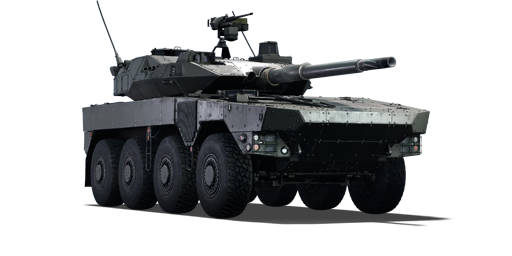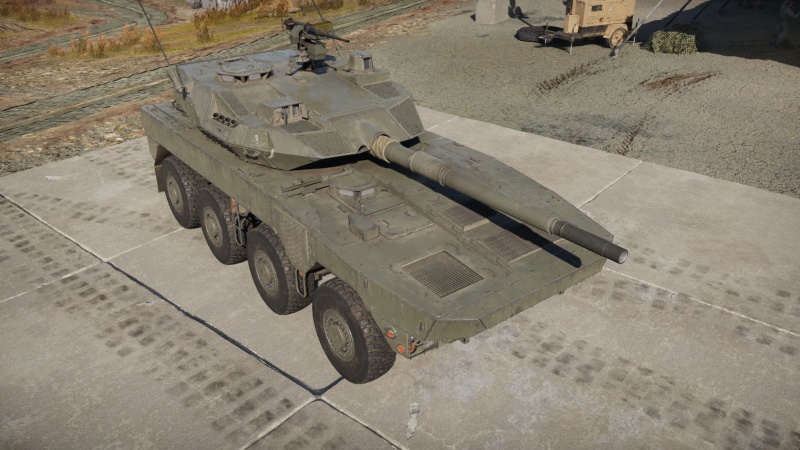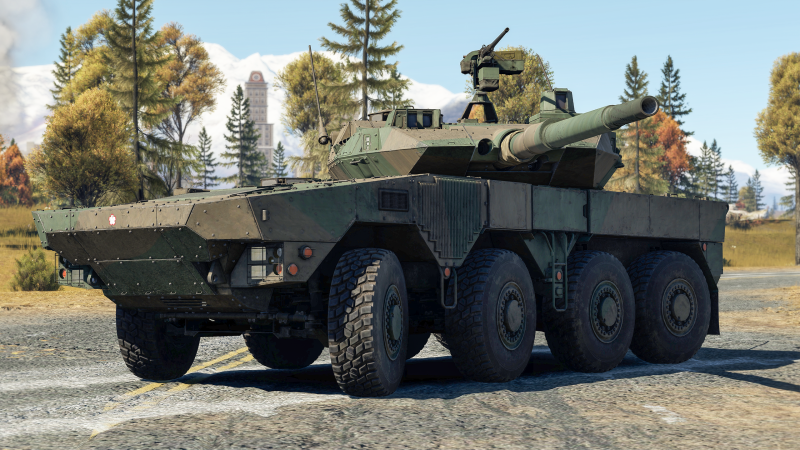Type 16
Contents
Description
The Type 16 is a rank VII Japanese light tank with a battle rating of 9.7 (AB/RB/SB). It was introduced in Update 1.89 "Imperial Navy".
General info
Survivability and armour
Describe armour protection. Note the most well protected and key weak areas. Appreciate the layout of modules as well as the number and location of crew members. Is the level of armour protection sufficient, is the placement of modules helpful for survival in combat? If necessary use a visual template to indicate the most secure and weak zones of the armour.
Armour type:
| Armour | Front (Slope angle) | Sides | Rear | Roof |
|---|---|---|---|---|
| Hull | 15 mm Upper glacis (80°)
5 Lower Front Plate (45°) |
15 mm Top (0°) 10 mm Bottom (0°) |
20 mm (9°) | 5 - 20 mm |
| Turret | 5 - 25 mm Turret front (0°)
5 mm Spaced armor (61°) |
25 mm (0°)
5 mm spaced armor (25°-38°) |
15 mm (0°) | 5 - 25 mm |
| Cupola | 25 mm (0°-13°) | 25 mm | 25 mm | 5 (commanders hatch) - 25 (Outer ring) mm (90°) |
Notes:
Mobility
| Game Mode | Max Speed (km/h) | Weight (tons) | Engine power (horsepower) | Power-to-weight ratio (hp/ton) | |||
|---|---|---|---|---|---|---|---|
| Forward | Reverse | Stock | Upgraded | Stock | Upgraded | ||
| Arcade | 111 | 41 | 26 | 810 | 1,088 | 31.15 | 41.85 |
| Realistic | 100 | 37 | 504 | 570 | 19.38 | 21.92 | |
Modifications and economy
Armaments
Main armament
| 105 mm JSW | Turret rotation speed (°/s) | Reloading rate (seconds) | |||||||||||
|---|---|---|---|---|---|---|---|---|---|---|---|---|---|
| Mode | Capacity | Vertical | Horizontal | Stabilizer | Stock | Upgraded | Full | Expert | Aced | Stock | Full | Expert | Aced |
| Arcade | 40 | -6°/+15° | ±180° | Two-plane | 26.42 | 36.56 | 44.40 | 49.10 | 52.24 | 8.7 | 7.7 | 7.1 | 6.7 |
| Realistic | 17.85 | 21.00 | 25.50 | 28.20 | 30.00 | ||||||||
The primary armament of the Type 16 MCV is a 105 mm JSW cannon, derived from the L7A3 much like many other NATO/BLUFOR vehicles. It features the standard selection of APFSDS, HESH, HEAT-FS, and smoke, in addition to the Type 93 shell, one of the better APFSDS at this rank. While you will struggle against 10.0 and 10.3 main battle tanks from the front, your gun is very effective against everything else. The HEAT-FS is especially effective against lightly armoured vehicles - it will often overpressure where the APFSDS will not deal sufficient damage.
When fighting MBTs, you should try to get side on shots. Type 93 will struggle against most 10.0s and 10.3s from the front, but from the side it will act like any other fin round. This is especially effective against "T series" tanks like the T-64, T-72, and T-80.
Ammunition
| Penetration statistics | |||||||
|---|---|---|---|---|---|---|---|
| Ammunition | Type of warhead |
Penetration @ 0° Angle of Attack (mm) | |||||
| 10 m | 100 m | 500 m | 1,000 m | 1,500 m | 2,000 m | ||
| Type 91 | HEATFS | 400 | 400 | 400 | 400 | 400 | 400 |
| Type 75 | HESH | 127 | 127 | 127 | 127 | 127 | 127 |
| M735 | APFSDS | 353 | 350 | 342 | 333 | 322 | 312 |
| Type 93 | APFSDS | 405 | 403 | 396 | 388 | 378 | 370 |
| Shell details | |||||||||
|---|---|---|---|---|---|---|---|---|---|
| Ammunition | Type of warhead |
Velocity (m/s) |
Projectile Mass (kg) |
Fuse delay (m) |
Fuse sensitivity (mm) |
Explosive Mass (TNT equivalent) (g) |
Ricochet | ||
| 0% | 50% | 100% | |||||||
| Type 91 | HEATFS | 1,150 | 10.5 | 0.05 | 0.1 | 1,270 | 65° | 72° | 77° |
| Type 75 | HESH | 760 | 10.8 | 0.1 | 4 | 3,890 | 73° | 77° | 80° |
| M735 | APFSDS | 1,501 | 3.7 | N/A | N/A | N/A | 76° | 77° | 80° |
| Type 93 | APFSDS | 1,501 | 3.4 | N/A | N/A | N/A | 78° | 80° | 81° |
| Smoke shell characteristics | ||||||
|---|---|---|---|---|---|---|
| Ammunition | Velocity (m/s) |
Projectile Mass (kg) |
Screen radius (m) |
Screen deploy time (s) |
Screen hold time (s) |
Explosive Mass (TNT equivalent) (g) |
| M416 | 730 | 11.4 | 20 | 5 | 25 | 50 |
Ammo racks

| Full ammo |
1st rack empty |
2nd rack empty |
3rd rack empty* |
4th rack empty* |
Visual discrepancy |
|---|---|---|---|---|---|
| 40 | 25 (+15) | 16 (+24) | 8 (+8) | 1 (+39) | No |
Note:
- The 3th and 4th Rack serve as First-Stage ammo stowage.
Machine guns
The Type 16 has an additional 7.62 mm coaxial MG, like most tanks at this tier. It also retains the roof mounted .50 calibre HMG in the American style; this can be extremely effective against light tanks, especially Soviet light tanks like the BMP-1, BMP-2, Object 906, and Object 685. It will easily penetrate them from the side, allowing you to secure a kill if you've only knocked out their mobility.
| 12.7 mm M2HB | ||||
|---|---|---|---|---|
| Mount | Capacity (Belt) | Fire rate | Vertical | Horizontal |
| Pintle | 1,000 (200) | 577 | -8°/+20° | ±120° |
| 7.62 mm Type 74 | ||||
|---|---|---|---|---|
| Mount | Capacity (Belt) | Fire rate | Vertical | Horizontal |
| Coaxial | 3,000 (250) | 500 | N/A | N/A |
Usage in battles
Like most light tanks in top tier you are extremely mobile and capable of pulling off some early flanking attacks on the enemy, weakening them and possibly slowing them down while your MBT allies crawl to your position and mop up any remaining enemy armor. Additionally, the Type 16 possess an extremely good combination of optics, unlike the Radkampfwagen which lacks the ability to use thermals, you have access to both thermals and night vision as well as a nice zoom of 4.0x all the way to 13.3x which makes you an excellent sniper. The Type 16 also provides you with a laser warning system/range finder combo package which makes it easier to tell if you have gained the attention of any enemy tanks during your expedition's into the wilderness.
In RB it is best to use your speed either to flank the enemy in order to snipe and scout them or reach a nice camping spot in hopes of delaying their advance, ideally near a choke point in the map where they will be bunched up and find it hard to maneuver once they notice you, slowing them down just a little bit more. You serve a vital role in matches as any amount of time the enemy team spends dealing with you they also spend ignoring your allies and the cap circles, delaying actions should be a priority even above killing as a dead tank can respawn and head elsewhere whereas you need to waste as much of their time as possible, killing engines and damaging tracks as well as scaring them via destroying their barrel (which almost always leads to the enemy running back behind friendly lines so the waste time prior to repairing) is all fair game and might as well be your mission in life, the more annoying you are the more likely your team will have the time needed to gain the upper hand and win. A final note, this vehicle CAN if needed brawl for a little while due to its lack of armor and the decently spaced crew layout but it should be your last resort, if at all possible avoid brawling and use your speed to reposition and continue the fight at a distance or on city maps try to run and get behind the enemy for ammo racks, unless brawling will distract the enemy for a while in which case go for it.
In AB your ability to flank is hampered by the massive floating text box over your head, who'd have guessed, so it may be best to put lots of obstacles such as buildings or terrain between you and any enemy tanks while driving around the map in order to avoid this issue until your ready to strike. If the map lacks such terrain features then you can also resort to acting as a support vehicle and stay with your teammates, using them as armor and providing fire support in addition to providing help with repairing all the breaches that are often lost during top tier battles. Finally, being a scout tank makes you rather Ideal for air support so whenever possible (and when its safe-ish) use it to help out allies in other parts of the map, your tank is fast but it can't be in two places at once, the air units you bring in can fix that little problem and can provide the much needed assistance your allies were lacking leading to a higher chance of winning the match.
Pros and cons
Pros:
- Excellent mobility
- Same gun and general ammo choices as the NATO tanks
- Gets improved Type 93 APFSDS, which can deal frontally with most vehicles it faces with
- Thermals
- Gen 3 Thermals (1200 x 800)
- Tier II firepower modification
- Available for gunner and commander
Cons:
- Large profile
- Wheeled vehicle
- Other than frontal armour, relatively weak armoured
- Side and rear can't withstand calibres above 12.7 mm
- Really does not like to accelerate in mud, snow or off-road conditions
History
In the early 2000's, Japan sought to develop a new combat vehicle to extend the operational mobility of their armored units. Furthermore, the new vehicle was supposed to counter the limitations of existing tracked vehicles, be able to rapidly respond to emerging threats in the event of an outbreak of hostilities and possess the ability to be airlifted or ocean transferred to more distant areas of operations, such as the Japanese island of Okinawa.
Thus, in 2007, engineers at Mitsubishi began development on what would become the Type 16 MCV. To satisfy all the requirements, it was clear from the onset that a lightly armored, yet highly mobile and well-armed wheeled vehicle would need to be developed. Already, by 2008, the order for four prototypes was issued, with deliveries going on until 2013.
Army trials of the vehicle went on until 2016, when after successfully passing them, it officially entered service with the JSDF under the designation "Type 16 MCV". Production began in the same year (2016), and is still ongoing today. Presently, around 100 Type 16 MCVs have been built and commissioned into service, with no units seeing combat action thus far.
- From Devblog
Media
- Skins
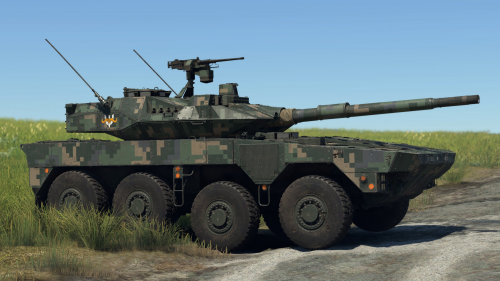
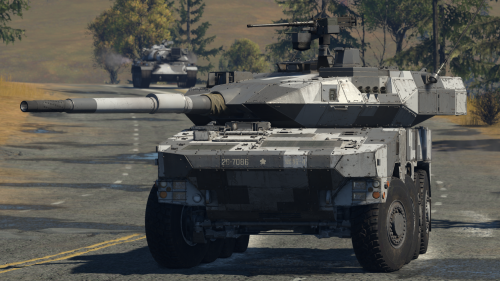
- Videos
See also
Links to the articles on the War Thunder Wiki that you think will be useful for the reader, for example:
- reference to the series of the vehicles;
- links to approximate analogues of other nations and research trees.
External links
| Japan light tanks | |
|---|---|
| Type 89 | I-Go Ko |
| Type 95 | Ha-Go · Ha-Go Commander |
| Type 98 | Ke-Ni |
| Other | Ka-Mi |
| IFV | Type 89 |
| RCV | Type 87 RCV (P) · Type 87 RCV · RCV (P) |
| MCV | Type 16 (P) · Type 16 (FPS) · Type 16 |
| USA | ▅M24 · ▅M41A1 |


